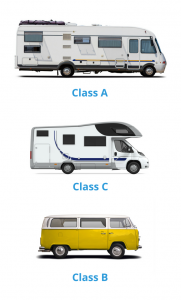According to Campandas:
Do you need a special license to drive an RV?
Unless you’re going BIG, probably not. Most states do not require a special license for RVs weighing under 26,000 pounds or towed vehicles under 10,000 pounds. Vehicles that can carry more than 16 passengers are often subject to special licensing (so you know, don’t go RVing in a literal school bus).

Most RVs weigh well under 26,000 pounds. For reference, the average Class B RV weighs between 6,000 and 8,000 pounds, while a Class C vehicle typically weighs between 10,000 and 12,000 pounds. Class A vehicles can weigh anywhere from 13,000 to 30,000 pounds. In other words, for
most kinds of RVs and campers, you do not need a special license. However, each state has it’s own rules, which can make things confusing for RV renters and new owners. To make it easy to find the information you need, we broke down the rules, state-by-state. Keep reading for
Campanda‘s comprehensive guide to RV driver’s license requirements in every US state.
Note: This article was updated in January 2018. We have done our best to ensure that the information is accurate, but state laws, rules and regulations are subject to change. We highly recommend that you check with your local DMV to confirm the details below before buying, renting or driving any RV.
What is a special license?
Broadly speaking, there are two types of special licenses: a commercial and non-commercial license. Some states require you to have a non-commercial special license in order to drive a recreational vehicle over a certain length or weight. Other states will require you to have a commercial driver’s license (CDL) — the kind of license needed for large and heavy vehicles likes buses or tractor trailers.
States That Require A Commercial Driver’s License
- Arkansas: CDL required for vehicle over 26,000 lb
- Connecticut: CDL (Class B) required for single vehicle over 26,000 lb; CDL (Class A) required for multiple vehicles with combined weight over 26,000 lb
- Hawaii: CDL (Class B) required for single vehicle over 26,000 lb; CDL (Class A) required for multiple vehicles with combined weight over 26,000 lb
- Kansas: CDL (Class B) required for single vehicle over 26,000 lb; CDL (Class A) required for multiple vehicles with combined weight over 26,000 lb
- New Mexico: CDL (Class B) required for single vehicle over 26,000 lb; CDL (Class A) required for multiple vehicles with combined weight over 26,000 lb
- Washington, D.C.: CDL (Class B) required for single vehicle over 26,000 lb; CDL (Class A) required for multiple vehicles with combined weight over 26,000 lb
- Wisconsin: CDL required over 45 feet
States That Require A Non-Commercial Special Driver’s License
- California: Class B license required over 26,000 lb or over 40 feet; Class A license required for towing over 10,000 lbs
- Maryland: Class B license required over 26,000 lb
- Michigan: Recreational Double “R” Endorsement required to tow a fifth wheel plus a trailer (it’s unlikely that you’ll ever need this)
- North Carolina: Class B license required for single vehicle over 26,000 lb; Class A license required for multiple vehicles with combined weight over 26,000 lb
- Nevada: Class B license required for single vehicle over 26,000 lb; Class A license required for multiple vehicles with combined weight over 26,000 lb; “J” Endorsement required to tow a vehicle over 10,000 lb (if the combined weight is less than 26,000 lb)
- New York: Recreational Vehicle or “R” endorsement required for vehicles over 26,000 lb
- Pennsylvania: Class B license required for single vehicle over 26,000 lb; equired for multiple vehicles with combined weight over 26,000 lb
- South Carolina: Class E license required for single vehicle over 26,000 lb; Class F license required for multiple vehicles with combined weight over 26,000 lb
- Texas: Class B license required for single vehicle over 26,000 lb; Class A license required for multiple vehicles with combined weight over 26,000 lb
- Wyoming: Class B license required for vehicle over 26,000 lb and towing under 10,000 lb; Class A license required for vehicle over 26,000 lb and towing over 10,000 lb
States That Do Not Require A Special Driver’s License
The following states do not require a special driver’s license to drive an RV. Where possible, we have provided links to the relevant state laws where the exemption for recreational vehicles can be found. Remember: When in doubt, contact your local DMV.
| Alabama (Ala. Code § 32-6-49.7) | Montana (§ 61-1-101, MCA.) |
| Alaska (AS § 28.90.990) | Nebraska (Neb. Rev. Stat. § 60-465) |
| Arizona (Ark. Code § 28-3102) | New Hampshire (N.H. § Saf-C 1801.02) |
| Colorado (Colo. Rev. Stat. § 42-2-402) | New Jersey (N.J. Rev. Stat § 39:3-10.11) |
| Delaware (Del. Admin. Code tit. 2 § 2213) | North Dakota (N.D.C.C. § 39-06.2-06) |
| Florida (Fla. Stat. § 332.53) | Ohio (Ohio Rev. Code § 4506.3) |
| Georgia (OCGA § 40-5-142) | Oklahoma (47 O.S. § 1-107.4) |
| Idaho (I.C. § 49-302) | Oregon (Or. Rev. Stat § 801.20 |
| Illinois (625 ILCS § 5/6-500) | Rhode Island (31 R.I. Gen. Laws § 10.3-16) |
| Indiana (CDL Manual) | South Dakota (S.D. Codified Laws § 32-9-3) |
| Iowa (Iowa Code §321.176A) | Tennessee (T.C.A § 55-50-102) |
| Kentucky (KRS § 281A-050 and CDL Manual) | Utah (Utah Code § 53-3-102) |
Louisiana ( LSA-RS § 32:40 | Vermont (23 V.S.A § 39-4103) |
| Maine (29A M.R.S § 1252 and CDL manual) | Virginia (Code § 46.2-341.4) |
| Massachusetts (DMV.org) | Washington (RCW 46 25-050) |
| Minnesota (Minn. Stat. § 169.011 or driver’s manual) | West Virginia (W. Va. Code § 17E-1) |
| Mississippi (Miss. Code § 63-1-203) | |
| Missouri (MO Rev Stat § 302.775) | |
A Simple Solution
If you’re worried about needing a special license to drive an RV, the solution is usually pretty simple: go smaller. A Class C vehicle, campervan (Class B) or travel trailer is unlikely to exceed the weight restrictions for your normal driver’s license. Smaller vehicles are also better for RVing beginners who may not feel as confident handling a huge rig.
Check out Campanda’s selection of RV rentals to find the perfect vehicle for your next trip!














